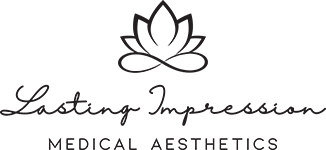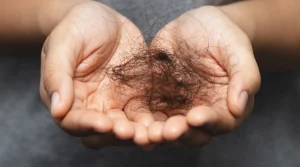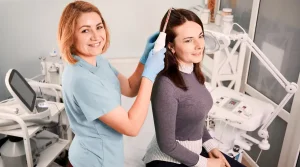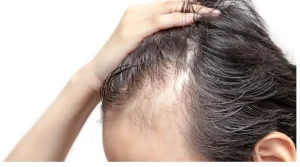Do you find that there is an unusually large amount of hair on your pillow or in your hairbrush? If this is the case, you are most likely curious about the average rate of hair loss, in addition to the myriad of other inquiries that are associated with hair thinning. You’re not alone. One of the most significant problems that people experience nowadays, both in terms of their health and their appearance, is thinning hair. In point of fact, hair loss affects over 35 million men and 21 million women in the United States.
Even though hair loss is a natural part of aging, it is essential to have an understanding of when it becomes abnormal, the causes that contribute to it, and the treatments that can improve hair health. The following are some of the responses to queries that are posed rather regularly about hair loss:
Am I going through my hair more quickly than I should?
To begin, hair shedding and hair loss are two quite different phenomena. It is considered normal for an individual to lose anywhere from 50 to 100 hairs on a daily basis, as stated by the American Academy of Dermatology Association. In addition, people frequently have substantial hair loss in the aftermath of stressful events such as giving birth, dropping a significant amount of weight, undergoing a medical operation, or recuperating from an illness.
Loss of hair happens when something prevents new hair from sprouting in its follicles. Genes, autoimmune diseases, hormone imbalances, dietary deficiencies, physical stressors, and specific hair grooming techniques are only some of the common causes of hair loss.
There is a possibility that an underlying health condition is the cause of gradual thinning on top of your head, the appearance of patchy or bald places on your scalp, and overall hair loss on your entire body. Make an appointment with your primary care physician if you are concerned about the amount of hair that you are losing so that they can set your mind at ease. A medical professional will be able to determine whether or not the strand loss you’ve experienced is abnormal.
Is it a family trait?
Yes. Hereditary hair loss is the most prevalent cause of hair loss in the United States, affecting 80 million people and making it the most common cause overall. This particular form of hair loss can affect either males or women. When it occurs in men, it is referred to as male pattern hair loss, and when it occurs in women, it is referred to as female pattern hair loss. Hereditary hair loss is a condition in which a person inherits genes that lead to a reduction in the size of their hair follicles, which ultimately results in the hair follicles being unable to produce new hair.
Is it permanent?
The good news is that in many instances, hair loss is just temporary. On the other hand, certain cases might be chronic and gradually worsen over time. With the appropriate care and treatment, regrowth is certainly a possibility. Because of this, it is essential to schedule an appointment with your primary care physician as soon as possible in order to receive a diagnosis and learn about your treatment choices.
What kind of damage might be caused by over-washing, styling, or coloring the hair?
The use of shampoo on a regular basis is not related in any way to the thinning or loss of hair that may occur as a result of this practice. On the other side, constantly dyeing, relaxing, or perming your hair can cause damage to your hair, which can eventually lead to hair loss. This damage can be reversed by not doing any of these things. The use of heated styling tools on the hair, such as blow dryers and curling irons, can also cause damage and breaking to the strands of hair, which can give the appearance of baldness. Even if you take better care of your hair, if a hair follicle is damaged, new hair cannot grow from that follicle and will not grow from it again.
Alterations to one's diet may affect the health of one's hair.
Indeed, a lack of proper nourishment can lead to hair loss. Vitamin D, biotin, vitamin A, and iron are the four specific vitamins that, when in insufficient amounts, can have a negative impact on hair health. For example, if you have just started a crash diet, this may be the reason for your loss.
Who exactly am I going to see as a physician?
A dermatologist is the appropriate medical professional to consult with problems affecting the hair. They are the authorities when it comes to the diagnosis and treatment of hair conditions. If you can get to the bottom of the issue as quickly as possible, your chances of achieving the outcomes you seek will be significantly increased.
Which therapies are the most effective?
At the Bergen County Hair Loss, we advise patients to undergo a number of different procedures, including the following:
- Rogaine: This topically applied liquid solution has been the therapy of choice for both men and women throughout its entire history.
- Propecia (for men): Because it helps lower DHT levels, this oral prescription medicine can be incredibly useful in regrowing hair. DHT is a hormone that can cause the hair follicle to become smaller, which can ultimately lead to baldness.
- Spironolactone is an anti-androgen medication that is prescribed to women. It reduces levels of testosterone and other “male hormones,” both of which are known to contribute to hair loss in women.
- Combs and brushes with low-level laser light therapy: These treatments, which make use of laser technology, have shown to be a non-invasive and painless technique to stimulate hair follicles and promote the growth of new hair.
- Platelet-rich plasma, or PRP, therapy involves injecting the patient’s own platelet-rich plasma back into the scalp. The PRP, which is high in growth factors, then works to encourage hair growth over the course of the treatment.





